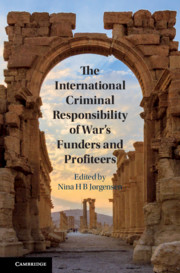Book contents
- The International Criminal Responsibility of War’s Funders and Profiteers
- The International Criminal Responsibility of War’s Funders and Profiteers
- Copyright page
- Contents
- Illustrations
- Contributors
- Acknowledgements
- Abbreviations
- Introduction
- Part I Financiers and Profiteers after World War II
- Part II Arms Fairs and ‘Flying Money’
- 4 Linking Economic Actors to the Core International Crimes of the Syrian Regime
- 5 Islamic State and the Illicit Traffic of Cultural Property
- 6 Arms Transfer Complicity Under the Rome Statute
- Part III Developing the Available Law
- Part IV Where Should the Buck Stop?
- Part V Criminal Accountability and Beyond
- Part VI Discovering and Recovering the Profits of War
- Index
4 - Linking Economic Actors to the Core International Crimes of the Syrian Regime
from Part II - Arms Fairs and ‘Flying Money’
Published online by Cambridge University Press: 18 September 2020
- The International Criminal Responsibility of War’s Funders and Profiteers
- The International Criminal Responsibility of War’s Funders and Profiteers
- Copyright page
- Contents
- Illustrations
- Contributors
- Acknowledgements
- Abbreviations
- Introduction
- Part I Financiers and Profiteers after World War II
- Part II Arms Fairs and ‘Flying Money’
- 4 Linking Economic Actors to the Core International Crimes of the Syrian Regime
- 5 Islamic State and the Illicit Traffic of Cultural Property
- 6 Arms Transfer Complicity Under the Rome Statute
- Part III Developing the Available Law
- Part IV Where Should the Buck Stop?
- Part V Criminal Accountability and Beyond
- Part VI Discovering and Recovering the Profits of War
- Index
Summary
When the protracted Syrian conflict eventually comes to an end and transitional justice in its many manifestations is properly operationalized, a test case for the prosecution of economic actors under international criminal law may emerge. The evidence of international crimes in Syria has been documented and subjected to scrutiny and analysis since the start of the conflict in 2011, by the United Nations, non-governmental organizations, and domestic investigative bodies. This chapter examines investigative approaches towards uncovering the role of economic actors alleged to have facilitated international crimes attributed to the Syrian regime. The work of the Commission for International Justice and Accountability (CIJA) and the limitations of the CIJA model in investigating international crimes of an economic nature are first explained before outlining the applicable jurisprudential framework with reference to customary international law. The chapter proceeds to examine how economic actors who are engaged in activities in Syria during the conflict might be held to account in law where they are suspected of the perpetration of core international crimes.
Keywords
- Type
- Chapter
- Information
- Publisher: Cambridge University PressPrint publication year: 2020

